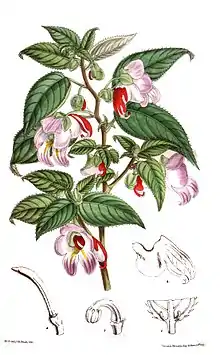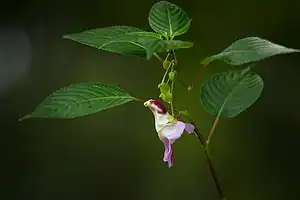Impatiens psittacina
Impatiens psittacina, known variously as the "parrot flower" or "parrot balsam" is a species of balsam from Southeast Asia that was described by the botanist Joseph Dalton Hooker and was noted for its flower that resemble a "flying cockatoo". It is known from Thailand, Burma and parts of India.[1]
| Impatiens psittacina | |
|---|---|
 | |
| Illustration by John Nugent Fitch accompanying Hooker's description | |
| Scientific classification | |
| Kingdom: | Plantae |
| Clade: | Tracheophytes |
| Clade: | Angiosperms |
| Clade: | Eudicots |
| Clade: | Asterids |
| Order: | Ericales |
| Family: | Balsaminaceae |
| Genus: | Impatiens |
| Species: | I. psittacina |
| Binomial name | |
| Impatiens psittacina | |
History
A balsam, Impatiens psittacina, or parrot flower, is a very rare impatiens species discovered in the Shan States of Upper Burma by Arthur Hedding Hildebrand, a British official. Seeds of it were presented to the Royal Gardens (Kew) in 1899 and it flowered in 1900 and a description was published in 1901 by Joseph Dalton Hooker who gave the common name of "cockatoo balsam".[2]
The specimen in Kew did not set seed but the capsules are said not to explode and disperse seeds as in many Impatiens.
The species grows in the wild in a small region of north Thailand (near Chiang Mai), Burma, and in the north-east Indian state of Manipur. The species name "psittacina" is Latin for "parrot-like",[3] in reference to parrot-shaped blooms viewed from the side.
The Thai government has prohibited exporting this species, so it is not in cultivation.[4] Counterfeit seeds are frequently sold.[5]
Description

The plant is erect and branches profusely and grows compactly to a height of about half a metre. Like other Impatiens species it has thick stems, the leaves have a serrulate margin. The flower is light purple and carmine red. The lateral sepals are orbicular and light green. The lower sepal is bulbous and narrows into a hooked spur tipped in carmine. The dorsal petal is orbicular and hooded while the lateral united petals are long.[1]
This species of Impatiens is known in Thai as thian nok kaeo (เทียนนกแก้ว; IPA: [tʰiːan nók kɛ̂ːw]),[6] which translates to "parrot impatiens".
References
- Morgan, P. Raymond (2007). Impatiens: the vibrant world of Busy Lizzies, Balsams, and Touch-me-nots. Timber Press. p. 205. ISBN 978-0881928525.
- Hooker, JD (1901). "Impatiens psittacina : Native of Burma. plate 7809". Curtis's Botanical Magazine. 127.
- "Plant Latin Dictionary". Archived from the original on 2015-07-10. Retrieved 2015-08-08.
- "Thailand Parrot Flower".
- "eBay screeshot of August 8, 2015".
- "The Wild Flowers of Thailand." Thai Life. National Identity Board, 1992. p. 45. ISSN 0125-6637